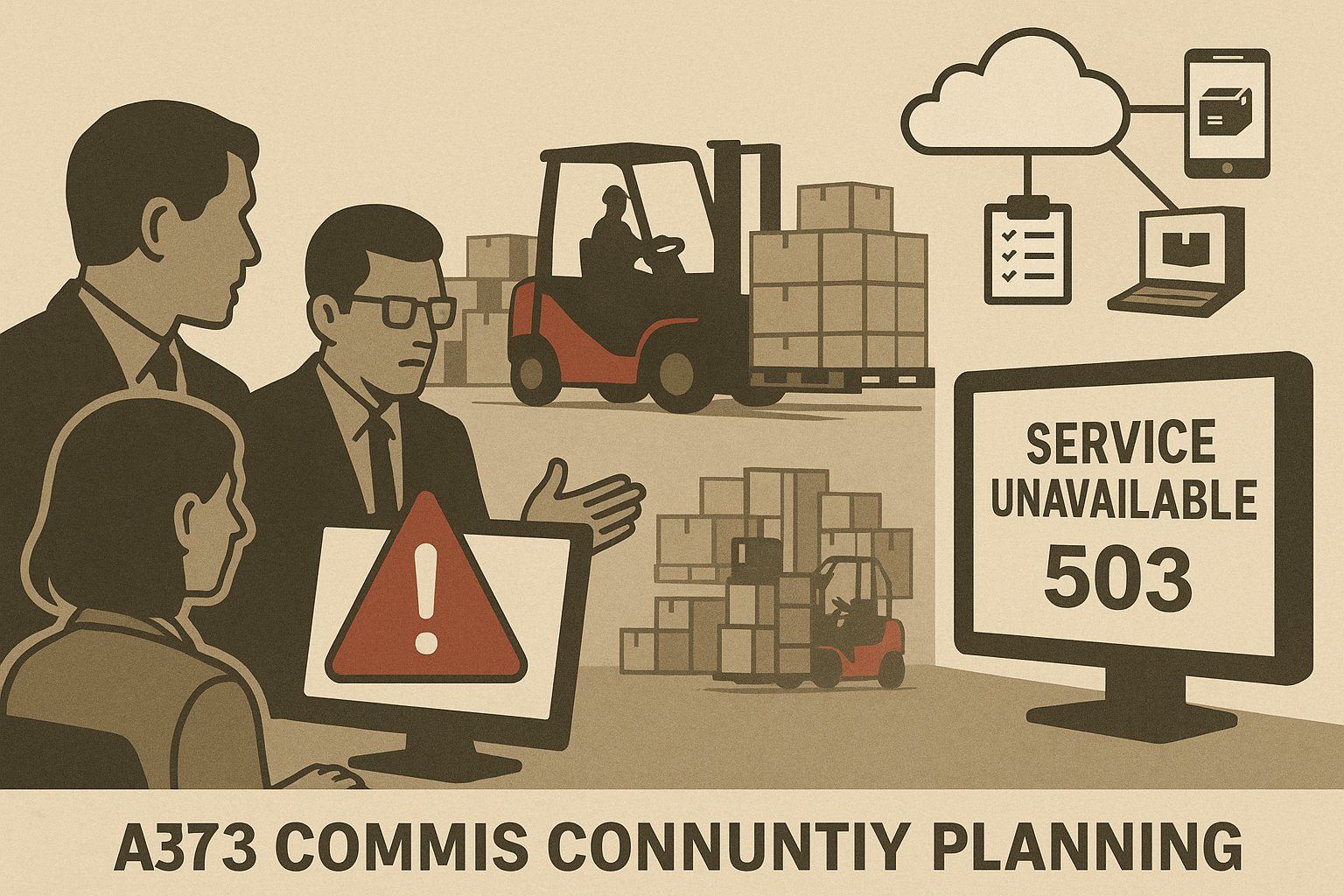Outsourced IT Partner’s Outage Disrupts Multi-Subsidiary Operations for 36 Hours
The Challenge
During a routine Monday inventory rollover, a national transportation and warehousing group with eight Canadian subsidiaries saw core systems freeze. The shared managed services provider, which hosted identity, EDI gateways, the warehouse management system (WMS), and the API layer for dispatch tablets, experienced a complete outage. What began as a “transient connectivity issue” became a 36-hour disruption that spread from cross-dock floors to executive dashboards.
The first hour cost visibility. Forklift operators lost live pick lists, and supervisors reverted to printed manifests that were already stale. By hour three, carrier tendering stalled. There were no labels, no customs pre-clearance, and no waybills. Dispatchers in the Prairie subsidiary radioed routes by voice. The Atlantic subsidiary created “hold zones” to prevent lot mixing. Customer portals, which the vendor also hosted, returned 503 errors. Shippers turned to phone and social channels for updates the company could not confirm with certainty.
The incident exposed weak points in the dependency map. Identity services were centralized with the vendor, so local failover accounts could not unlock critical applications. A single vendor-managed integration broker sat between the WMS and carrier EDI endpoints. When it failed, every subsidiary felt it. Backups existed, but restores required the vendor’s orchestration keys. The group’s target recovery time objective (RTO) of four hours and recovery point objective (RPO) of 15 minutes, highlighted in board materials, proved aspirational once a third party held the controls.
Operations worked to preserve chain of custody. Without system-driven lot tracking, teams used temporary logs and tamper seals, aware this could create audit gaps under Canadian customs programs and contractual quality clauses. There was no evidence of a privacy breach, but leadership initiated a preliminary PIPEDA assessment. The vendor processed customer contact details and shipment references, and the company needed to confirm whether any unauthorized access occurred during failover attempts. This analysis competed with the urgent need to protect perishables and prioritize medical and critical-infrastructure shipments.
By nightfall, the financial impact was measurable: overtime for manual processing, penalties for missed service-level commitments, fuel wasted on rescheduled routes, and credits to key accounts whose freight sat idle. Soft costs rose as well. Sales teams reassured national retailers. Procurement fielded difficult questions about vendor due diligence, SOC 2 claims, and the enforceability of a “four-hour” service commitment. Internally, the focus shifted to root causes. Why were change freezes and maintenance windows controlled only by the vendor? Why was multi-region failover planned but not proven? Why did each subsidiary run local exceptions that made a uniform workaround impossible?
At hour 36, systems returned, queues drained, and trucks moved. The ledger of consequences remained: missed pickups, strained client trust, probable chargebacks, and a clear lesson that operational resilience cannot be outsourced, even when the outage is.
Our Solution
We were engaged to strengthen operational resilience, vendor governance, and continuity planning in line with Canadian privacy and cybersecurity requirements.
Key workstreams included:
– Operational risk and dependency audit: mapping single points of failure across identity, EDI, WMS, and network services, and reviewing SLAs, business continuity plans, and PIPEDA documentation.
– Vendor Risk Management (VRM): implementing a VRM framework aligned to ISO/IEC 27036 and NIST SP 800-161, including continuous monitoring, defined risk tiers, and escalation paths.
– Resilience engineering: designing a multi-region, multi-cloud disaster recovery strategy and introducing local administrative break-glass access to reduce dependence on a single provider.
– Contract remediation: supporting renegotiation of managed service agreements to embed enforceable RTO/RPO terms, right-to-audit, breach notification obligations, and subcontractor transparency.
– Privacy assurance: performing targeted PIPEDA impact assessments and validating vendor controls for personal information related to shipments and customer contacts.
– Exercises and training: conducting live failover tests and tabletop exercises across all subsidiaries, clarifying roles and responsibilities, and refining escalation playbooks.
The Value
The program delivered measurable benefits across operations, governance, and compliance:
– Mean time to recover during tests: reduced by 68% (from 36 hours to under 12 hours).
– Vendor dependency risk: reduced by 45%, driven by local break-glass access and a secondary failover path.
– Continuity maturity: improved from ad hoc to standardized across eight subsidiaries, based on our readiness scorecard.
– PIPEDA posture: elevated from reactive to proactive through documented data flows, DPIAs, and vendor attestations.
– Financial exposure: SLA penalties dropped to zero in the two quarters following implementation, and overtime related to manual workarounds declined significantly.
The organization regained stakeholder confidence and established an auditable, repeatable framework for resilience that meets Canadian privacy, ethical, and cybersecurity standards.


